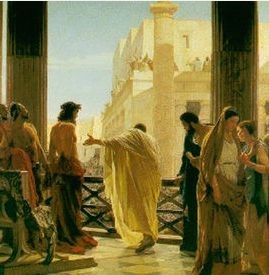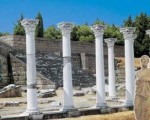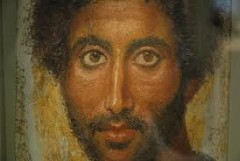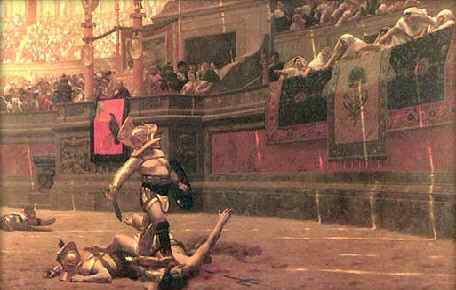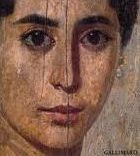
It’s Easter Friday.
On this very Friday, Jesus Christ was condemned and crucified.
I would like to bring to the fore a dream concerning the decisive moment of that day, the judgment of Christ, as reported in Matthew, ch. 27, 11-24.
Let’s go over the events :
Jesus is brought to court to be judged by the chief justice, the harsh and cunning Roman governor of Jerusalem, Pontius Pilate.
Before him the governor sees a man, who’s just been beaten by Jews who were lead up to it by their own priests.
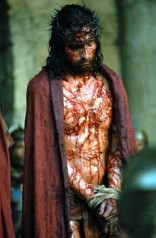
They accuse Jesus of being a rebel who affirms to be king, thereby threatening the power of the Roman Emperor. Pilate interrogates the prisoner, whose silence or answers both trouble him. This prisoner is saying that his kingdom is not of this world. The Jews call him the “Messiah”, which means in Greek “Christ”. Pilate knows that Christ means “the one who received divine grace”. Pilate believes in the Divine, in Zeus, the Roman people have the deepest respect for the gods, they honor and fear their different manifestations.
So Pilate uncreasingly feels ill at ease, even more so since he finds no reason to condemn this man. He tries to save him.
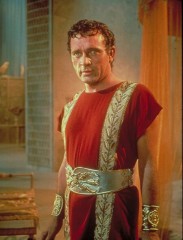
He knows about the Jewish custom of liberating a prisoner at Easter time. A criminal named Barrabas has just been sentenced. So Pilate asks the priests who are accusing Christ : “Whom do you want me to release, Barrabas or Jesus who is called Christ ?”
And the text adds: “For he knew the priests had accused Jesus out of jealousy.”
Pilate is sitting on the judge’s seat, he is thinking about the situation.
At that moment, something happens that is unimaginable in our courts, a man comes in, sent by Claudia Procula, Pilate’s wife. The servant asks the governor’s permission to deliver her urgent message to him.
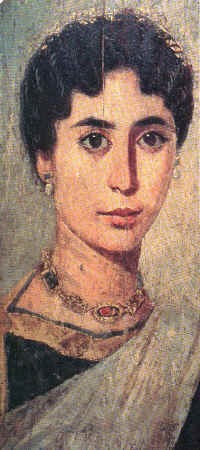
He tells the governor that she begs him not to be involved in this matter. “Let there be nothing between you and this just man.” She explains : she’s just had a dream and she suffered a great deal because of this man in her dream.
Does the servant say this publicly ?... In any case Matthew, the Jew, future Christian evangelist, reports the servant’s intervention as to Claudia Procula’s dream.
![protrait-fayum-homme-intense[2].jpg](http://theblogofdreams.blogspirit.com/media/01/02/1711073565.jpg)
Pilate listens to the messenger, then continues with the open court. And what is his reaction ? He, the judge, finds no motive for accusation. He feels indignant, revolted, at seeing the Jews demand the death of an innocent man and at the same time ask for the liberation of a murderer.
He tergiversates, he tries to defend Christ, he asks the near riot crowd :
“- What evil has he done? ”
In response he hears :
“Crucify him! Crucify him !”
And why? Because Christ calls himself the Son of God.
The governor feels increasingly troubled, he becomes frightened : his wife’s dream, Christ’s assertions about his own identity, confirmed by the Jews, all that turns to a nasty business. He feels overwhelmed.
Again Pilate beats around the bush and tries to release Jesus but the crowd sets on killing him. The judge realizes that he won’t get anywhere and must close the case quickly.
It’s Friday. As governor of the Jews, he knows the customs.
Next Sunday is the famous Jewish “Pessah”.This is a huge feast commemorating the day when Moses, about 1200 years earlier, liberated the Hebrews from slavery in Egypt. Since that time, each year Jerusalem hosts a yearly celebration during which every Jew comes to make a sacrifice in the Temple in a spirit of remembrance and gratitude.
Pilate knows that there’s going to be an enormous gathering in Jerusalem and there could be manifestations and trouble. The governor wants peace and calm. So he asks for a bowl of water. Standing before the multitude, in a symbolic gesture, he washes his hands :
“I am innocent as to the blood of this just person, he says, this is your business. “
The Governor has just publicly shown that he is not responsible for Christ’s death.
![PilateWashesHands[1].jpg](http://theblogofdreams.blogspirit.com/media/00/01/2149121361.jpg)
What caused Pilate to declare that Christ was a just man ? Aside from his personal conviction isn’t that the expression his wife had used?
“Let there be nothing between you and this just man.”
Could you imagine today a judge interrupting the court proceedings to listen to his wife’s dream ? A judge taking into account a dream’s warning before judging the accused ?
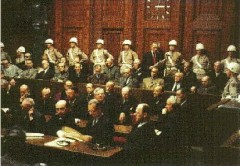
This historical excerpt is a tremendous testimony showing the prevailing conception in Antiquity : all over dreams were recognized and respected by Jews as well as Greeks, Romans and Christians. They were of such paramount importance that the most eminent rulers, before reaching their decisions, took into account their own dreams as well as those of people around them.
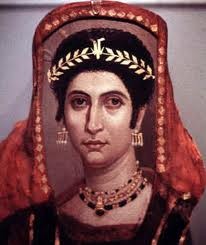
I thank the artists and photographers.
Christ crucified by Savator Dali, painted according to a vision of St John of the Cross
Pilate, played by Richard Burton
Antique woman’s head: work of Fayoum
Antique man’s head: work of Fayoum
Pilate and the crowd saying “Ecce Homo” “ by Antonio Ciseri, 19th century
Pilate washes his hands by an unknown painter : tumeke.blogspot.com
Picture of the Nuremberg trial, 1945
Antique woman’s head, work of Fayoum
